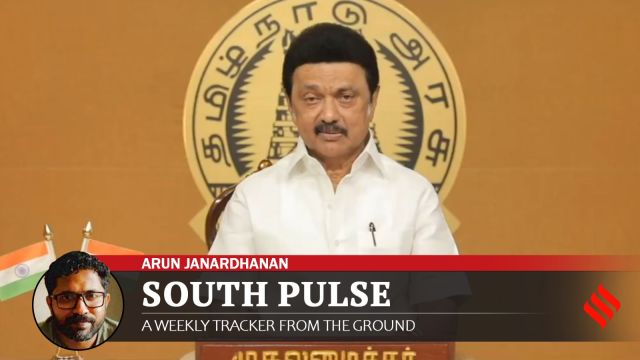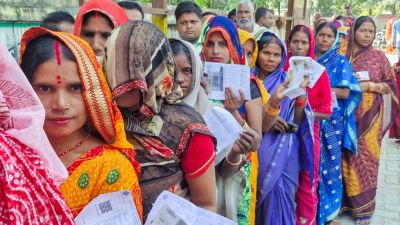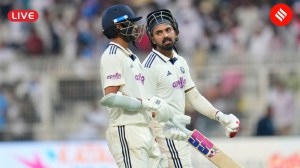Why Tamil Nadu, Centre are at loggerheads over NEP, language politics
Centre's bid to not release Rs 2150 crore Samagra Shiksha funds to Tamil Nadu has ramifications for a large section of students and teachers, even as DMK-led alliance is set to hold a protest Tuesday.
 In a sharp reaction, Chief Minister and DMK president M K Stalin said Tamils would not accept such “blackmail”, asking "which constitutional provision" made the three language formula mandatory. (X/Stalin)
In a sharp reaction, Chief Minister and DMK president M K Stalin said Tamils would not accept such “blackmail”, asking "which constitutional provision" made the three language formula mandatory. (X/Stalin)The long-standing tussle between Tamil Nadu and the Centre over the devolution of funds has now turned into a battle over policies on education and language.
Union Education Minister and BJP leader Dharmendra Pradhan’s Saturday remarks indicating that Tamil Nadu would not be provided funds under Samagra Shiksha until it implements the National Education Policy (NEP), 2020, and adopts its three-language policy has set off a storm in the state.
The DMK-led Tamil Nadu government has renewed its attack on the BJP-led Centre for not clearing over Rs 2,150 crore Samagra Shiksha funds due to the state.
Stung by Pradhan’s remarks, the Tamil Nadu leaders, cutting across party lines with the exception of the BJP, slammed the Narendra Modi government over the NEP and trilingual policy.
In a sharp reaction, Chief Minister and DMK president M K Stalin said Tamils would not accept such “blackmail”, asking “which constitutional provision” made the three language formula mandatory. “If he speaks arrogantly, Delhi will witness the trait of Tamil people,” he warned.
Deputy CM and Stalin’s son Udhayanidhi Stalin was more blunt, saying “Taunting Tamil Nadu will be like touching fire.”
Pradhan alleged that the DMK government’s refusal to accept the NEP 2020 and three-language formula was “politically-motivated”, saying “they cannot think they are above the Constitution”.
However, even the Opposition parties in Tamil Nadu slammed the Modi government over its stance on the issue.
AIADMK general secretary Edappadi K Palaniswami or EPS castigated the Centre’s alleged bid to impose Hindi on Tamil Nadu. Actor Vijay, the Tamilaga Vettri Kazhagam (TVK) chief, alleged that the Centre’s approach was “fascist”.
The NDA ally Anbumani Ramadoss, the PMK president, and DMDK general secretary Premalatha have also criticised the three-language policy, calling it an attack on the state’s autonomy.
Tamil Nadu Congress chief K Selvaperunthagai flagged the Centre’s alleged neglect of the state rights.
Conflict over language
While the BJP dispensation has pushed for the NEP as education reform, the
Dravidian parties have framed it as an “existential battle over language and identity”. The Tamil Nadu parties’ opposition to “Hindi impostion” dates back to their anti-Hindi agitations of 1938 and 1965. The Dravidian movement, which gave rise to both the DMK and the AIADMK, was built on the principle of linguistic self-determination, with its leaders championing Tamil Nadu’s two-language policy of Tamil and English for decades.
In 2020, when the NEP was launched, the then AIADMK CM Palaniswami rejected the three-language formula, calling it “painful and saddening.” He also underlined that C N Annadurai, Tamil Nadu’s first Dravidian CM, had framed the two-language policy in 1968, and that M G Ramachandran or MGR and J Jayalalithaa had always opposed Hindi imposition. “The entire state and almost all parties support the two-language policy,” he told the Modi government.
With Tamil Nadu headed for the Assembly polls in a little over one year, the DMK has doubled down on its criticism of the NEP and the three-language formula. The party has opposed several reforms proposed by the NEP – including the common entrance exams for undergraduate admissions, common exams for Classes III, V, and VIII, and four-year degree programme with multiple exit options – holding that it would increase dropouts and create two tiers of graduates.
To counter NEP, the DMK government announced in 2022 the formation of a State Education Policy (SEP) and constituted a 13-member expert panel,
headed by retired Delhi High Court chief justice D Murugesan, to draft it, whose members included Viswanathan Anand and prominent Carnatic musician T M Krishna. While the committee submitted its report last year, the SEP has yet to be firmed up by the Stalin government.
Implications of standoff
The row between the Centre and Tamil Nadu over the NEP has ramifications for a large section of students and teachers.
Without the central funds, teacher salaries, student welfare programmes, RTE (right to education) reimbursements for underprivileged students, self-defence training for schoolgirls, transport for children in remote areas, and school upgradation projects would be in jeopardy.
State Education Minister Anbil Mahesh Poyyamozhi said, “Over 40 lakh students and 32,000 teachers depend on these funds”, adding that “Tamil Nadu is already spending Rs 76 crore per month on teacher salaries and Rs 400 crore annually for RTE. This burden is growing due to the lack of central support.”
A senior state education official said, “Samagra Shiksha has been running for the past few months with state funds. But going forward, it will be challenging without the Centre’s contribution.”
Federal divide
The dispute between the Tamil Nadu and the Centre is also said to be about state autonomy. Tamil Nadu, along with states like Kerala, West Bengal and Punjab, has refused to sign the PM SHRI schools MoU, alleging that the Centre was stepping into the state’s jurisdiction.
Dharmendra Pradhan has insisted that Tamil Nadu must “accept NEP in letter and spirit”, accusing the DMK government of opposing it to extract political mileage.
The DMK camp, however, alleges that the BJP-led government was using financial pressure to force compliance, thereby “setting a dangerous precedent for Indian federalism and undermining states’ right to shape their education policies”.
Talking to The Indian Express, Dr J Jeyaranjan, vice-chairman of Tamil Nadu’s State Planning Commission, said the standoff was part of a larger conflict. “We want a modern kind of education, they want to get back to the old system. They are couching it in a different language, making it exclusive for upper castes, while we push for an inclusive system. In this latest conflict, the arena alone has been shifted—from finance to education. It will be health tomorrow,” he claimed.
Jeyaranjan said the conflict has a bearing on governance and policy planning.
“When they withhold Rs 2,500 crore, the state has no choice but to find that extra money—we cannot stop paying teachers,” he said. “Politically, this is not just about finances – it is about whether we stand by our ideology or surrender. Right now, we are pushing ourselves to the limit, mobilising every possible resource to keep the system running.”
A top source in the state government alleged the Centre was attempting to redefine governance itself. “The BJP-led government is transgressing all limits, unlike past Congress governments who never did it so blatantly. The Supreme Court came down heavily on the Governor, yet he continues to delay clearing key Bills. There is a state legislation for our universities, but the Governor insists they follow UGC circulars,” he said.
Pradhan has projected the Tamil Nadu government’s position as an unwillingness to adopt “progressive reforms”, asking “Are you opposed to the holistic, multi-disciplinary, equitable, futuristic, and inclusive framework of the NEP?”
However, several Tamil Nadu leaders have held that “the very design of NEP prioritises centralised decision-making over regional educational needs”.
In a sign of escalation of conflict, the DMK and its allies are set to hold a protest over the issue on Tuesday, even as Pradhan dismissed the state government’s opposition as “politics” while asserting that the Centre is committed to implement the NEP across the country.


- 01
- 02
- 03
- 04
- 05




























